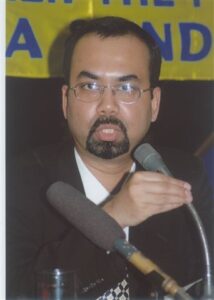Intrepid Indian entrepreneur in China
China-based Indian entrepreneur Sagnik Roy is a Sinologist and a member of the board directors of TXYCO LTD (a company engaged in textile, natural resources and rubber & tire industry). He is also an adviser to various local government bodies in China. Currently based in Xiuyan in North-east China, Roy is also a governing board member of US-based Environmental Education Media Project for China (EEMPC) and engaged in promoting environmental awareness.
His contacts at political and bureaucratic circles have made him a unique foreign resident of China. Local Chinese people feel a twinge of envy for his mastery of Putonghua. He can speak Mandarin with perfect poise and elan and his fluency in the language is amazing.
Strathmore’s Who’s Who and Princeton Who’s Who named Roy as one of the influential foreigners in China in 2007 and 2008.
Roy, who studied in Visva-Bharati, Santiniketan, talks about his passion for Chinese language, culture and philosophy, his unique experience of living in China, its economic might, China’s business-friendly climate and the potential of India-China relations.
Q: You went to China in early 1990s on a Chinese language scholarship. Why did you decide to become a China resident?
I was a student of Cheena Bhavan, Visva-Bharati (Santiniketan, West Bengal). I came to China in 1991 on a Cultural Exchange Programme. I was given two scholarships: one from India’s Ministry of Human Resources Development and the other was from Chinese Education Commission.
My research topic was Chinese philosopher Zhuang Zi’s thoughts and philosophy. Later I worked on “India-China complementary cooperation”.
There was not a single reason for staying back; I tell people I stayed back because of my ming (destiny). One of the main reasons for not going back to India was that I got a job offer from a Beijing-based US firm before I left Beijing Language and Culture University.
Q: Please share some experiences of your initial years…
I landed in Beijing with just $20 in my pocket on a wintry morning in October, 1991. I still recall that I sent a letter to my mother after reaching here. I wrote that there was no traffic jam in Beijing. There were also no birds either. (I grew up in a place in West Bengal where I used to wake up to the twittering of birds in the morning). The scenario has of course changed now.
Initially I was given a one-year scholarship. Later I was given an extension. I decided not to go back to Santiniketan and thought I’d try my luck in Beijing.

In 1992-93, I did part-time jobs mostly as an interpreter. I worked for Indian pharmaceutical firms like Torrent, Lupin and Wockhardt.
I joined Sinofile, a subsidiary of Capital Resources Ltd. in 1994 as office manager in Beijing, later I became administrative & finance officer. The office was close to Xinhua News Agency HQ at Xuanwu Men. I worked there for two years.
In 1996-97, I decided to do something on my own. In the initial years, I tried my hands on so many things — from baseball cap to guar gum. But nothing worked.
Confucius said: “Choose a job you love, and you will never have to work a day in your life”. For many years I worked for 15 to 16 hours a day, seven days a week.
Then one day, Madam Li (a senior executive of Minmetals) from Shanxi phoned me asking if I could supply iron ore. I said yes! I signed a deal worth $1.5 million with Shanxi Minmetals in 1997. The contract was carried out without a hitch. It gave me a huge boost. If the deal was not done, perhaps I wouldn’t have been in China today. I am also indebted to Prof Zhang, DG of Ministry of Metallurgy, who helped me immensely. I also got a lot of support and encouragement from a few diplomats at the Indian embassy.
After 2000, when minerals market started becoming volatile like metals, I started thinking of diversifying.
Q: What is so striking about Chinese entrepreneurs?
What strikes me about Chinese entrepreneurs is their lifestyle. A top Chinese firm’s chairman travels by economy class, while in India a company vice president travels by business class, but of course there are exceptions.
Q: Entrepreneurs in India face problems like red-tapism while setting up business. Do you have any grouse in doing business in China?
Things are quite easy and smooth in China, if done in the right way with right attitude and passion. There’s little or no interference from bureaucrats and politicians. As a matter of fact, they can be helpful and supportive if you know how to communicate with them.
Q: What makes China different from India as far as setting up business is concerned?
From what I have seen, there is less political or bureaucratic interference in China; there is no pressure from labour unions. There is also freedom for hiring and firing as long as you go by the book.
About five years ago we had to set up an import/export company to deal separately with one of our products line. It took just 15 working days to get the company running and doing export, import and open L/C. The entire process involved permits and licences from as many as 16 different agencies.
Q: China is worried about corruption in public life. A billionaire businessman was executed a few days ago by the government. Your comments…
Corruption is present everywhere and China is no exception. No leadership can eradicate corruption totally. What the Chinese leadership is trying to do is to reduce it to the best of its ability so that social stability and economic growth are not jeopardized.
Q: China’s Communist Party vowed to give markets a decisive role in allocating resources; but state intervention in the economy remains pervasive. Your comments…
As far as domestic economy is concerned, market forces dictate terms, the government plays along in consultation with industry associations adjusting regulations to suit the market. Most of the time, intervention is effected with a positive outcome in mind, I can cite numerous examples of this. Internationally, like any patriotic and responsible government, they do use resources like rare earth metals or even garlic to achieve diplomatic objectives.
Q: How about minimum wages in China?
People here want more no matter how much they earn; that’s why they work harder to get to the next level. This is a major driving force for the economy. As for minimum wages, I won’t be able to find anybody to work for me if I say I would pay minimum wages in our factory or even when I was looking for a maid servant in Beijing. In other words, market forces me to pay higher; this is more powerful than the force of law.
Q: What is your opinion on Modi’s ‘Make in India’ campaign?
State leaders, governments as well as trade and industry associations have talked about using and making things in India. Perhaps use of ‘Swadeshi’ products during pre-Independence period was when it all started.
Today, India-China bilateral trade deficit is around $40 billion which clearly shows India has willingly or unwillingly promoted “Make in China” and all previous attempts of making in India came a cropper. When it is obvious that the goals cannot be reached, India shouldn’t adjust the goals; it should adjust its actions and steps. Success depends upon preparations in advance, and without such preparation, failure is almost a certainty.
It is very important to know what specific steps Mr Narendra Modi will take to back up “Make-in-India” campaign. Only future will tell whether necessary preparation was followed by the PM’s speech and actions as well as steps were adjusted.
Confucius said: “In a country well governed, poverty is something to be ashamed of. In a country badly governed, wealth is something to be ashamed of”. When “to get rich is glorious” ideology (zhifu guangrong – Deng Xiaoping) is ingrained in the minds of people, then there is a will to win, the desire to succeed, the urge to reach one’s full potential… these are the keys that will unlock the door to personal excellence which lead to a prosperous nation.
Q: Your views on the potential of India-China relations…
India-China relations are more than 2,000 years old. We do have problems, but what matters is how we address and solve them. There are complex issues that can’t be sorted out overnight. Leaving personal ego and dogmatic thinking behind, bureaucrats and politicians on both sides need to make long-term time-bound plan and address each existing issue. A stable long-term government with ability to make decisions at both ends is essential for this. Harmony between these two nations will enrich each other as well as help other nations.
